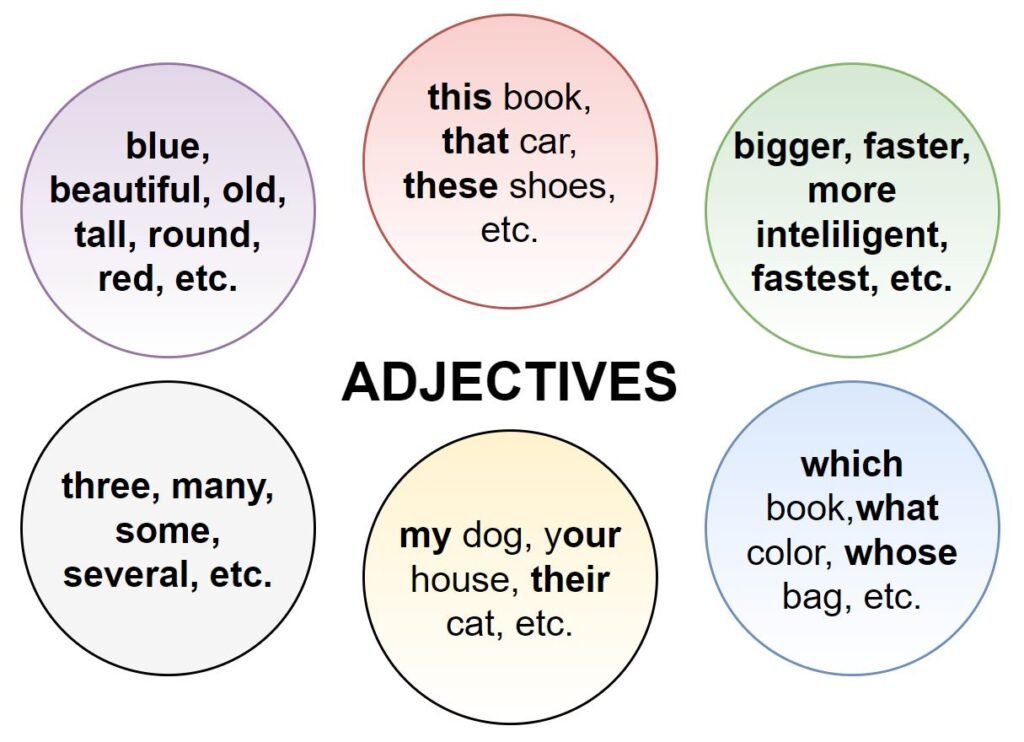Master Adjectives in English: Definition and Examples
Adjectives are an essential part of the English language. They are words that describe or modify nouns, pronouns, or other adjectives. Adjectives provide additional information about the size, shape, color, quantity, quality, or characteristics of the noun or pronoun they are referring to. They help to make our language more vivid and descriptive.
Table of Contents
Definition of Adjectives in English
An adjective is a word that gives more information about a noun or pronoun. It can be used to describe the size, shape, color, age, origin, material, or any other characteristic of a person, place, thing, or idea. Adjectives are an important part of speech as they add depth and detail to our sentences.
Examples of Adjectives
Here are some examples of adjectives in action:
- The blue sky
- A large house
- An old book
- A friendly dog
- A delicious meal
In these examples, the adjectives “blue,” “large,” “old,” “friendly,” and “delicious” provide additional information about the nouns they are describing. They help to paint a clearer picture in the reader’s mind.
Types of Adjectives in English
Adjectives can be categorized into different types based on the information they provide. Here are some common types of adjectives:

Descriptive Adjectives
Descriptive adjectives describe the characteristics or qualities of a noun. They provide more information about the noun’s size, shape, color, or appearance. Examples include “beautiful,” “tall,” “round,” and “red.” More examples:
| Examples |
|---|
| The blue sky |
| A beautiful flower |
| An old house |
Quantitative Adjectives
Quantitative adjectives describe the quantity or amount of a noun. They answer questions such as “how much?” or “how many?” Examples include “few,” “many,” “some,” and “several.” and:
| Examples |
|---|
| I have three books |
| There are many people in the park |
| We need some milk |
Demonstrative Adjectives
Demonstrative adjectives point out or identify a specific noun. They indicate whether the noun is near or far in relation to the speaker. Examples include “this,” “that,” “these,” and “those”. More examples:
| Examples |
|---|
| This book is interesting |
| That car is expensive |
| These shoes are comfortable |
Comparative and Superlative Adjectives
Comparative adjectives are used to compare two or more things, while superlative adjectives are used to compare three or more things. Examples of comparative adjectives include “bigger,” “faster,” and “more intelligent.” Superlative adjectives include “biggest,” “fastest,” and “most intelligent.”
Possessive Adjectives
Possessive adjectives indicate ownership or possession. They show who something belongs to. Examples include “my,” “your,” “his,” “her,” “our,” and “their.”
| Examples |
|---|
| My dog is playful |
| Your house is beautiful |
| Their cat is cute |
Interrogative Adjectives
Interrogative adjectives are used to ask questions about a noun. They are often used with the words “which,” “what,” and “whose.” Examples include “which book,” “what color,” and “whose car.”
| Examples |
|---|
| Which book do you recommend? |
| What color is your car? |
| Whose bag is this? |
Using Adjectives in English Effectively
When using adjectives, it is important to choose the right ones to enhance your writing. Here are some tips for using adjectives effectively:
- Be specific: Instead of using generic adjectives like “nice” or “good,” try to be more specific. For example, instead of saying “a nice day,” you could say “a sunny day.”
- Avoid excessive use: While adjectives can add depth to your writing, using too many can make it sound cluttered. Choose the most relevant and impactful adjectives to convey your message.
- Consider the context: The adjectives you choose should be appropriate for the context of your writing. For example, when describing a formal event, you might use adjectives like “elegant” or “sophisticated.”
- Use a variety of adjectives: To keep your writing interesting, try to use a variety of adjectives. This will prevent repetition and make your language more engaging.
- Revise and edit: After writing, take the time to review your work and make sure your adjectives enhance the overall meaning and clarity of your sentences.
By using adjectives effectively, you can make your writing more engaging and descriptive. They help to create a clearer picture in the reader’s mind and add depth to your sentences. So, next time you write, remember to choose your adjectives wisely.